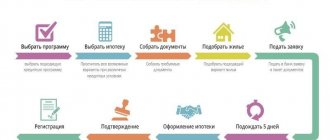Legislative norms
When the loan goes along with the use of maternal capital, there are no questions about providing shares to children.
These issues are resolved immediately after the loan is repaid, that is, the division occurs automatically. This strict requirement of the state is aimed at supporting the property rights of the younger generation. First, a collateral agreement is signed, then a home is purchased, and only then married couples are faced with the need to fulfill the conditions of the capital.
But children are not yet indicated as future owners in a deal to buy an apartment, although parents sign a statement (promise) that they will carry out all the necessary manipulations later. Namely, after removing all encumbrances and closing the credit account.
You can get a cash loan right now, select a bank:
All transactions with property with the participation of children, when the property must be pledged, are carried out in the Russian Federation with the consent of the guardianship authorities. So, when selling an apartment in order to buy more comfortable housing using bank money, managers should tell them about this in advance.
4 banks that are happy to issue mortgage loans
Afterwards, they must take consent from the board of trustees, first that the existing meters will be sold, and then on the fact that the new property will then be pledged to the department. There may be nuances with this, because there is a risk of non-return, when a minor, like the parents, will simply be left without a corner.
When using such a scheme, the living conditions of children should not become worse. The government agency looks at the quality of construction of the “old” and “new” apartments, and the actual size of the share in these premises. When the child is already 14 years old, all operations at the notary must be carried out with his written approval.
We have collected original reviews on this topic here, reviews from real people, many comments, worth reading.
Go ahead, select the section that suits you:
If shares are not allocated to children: legal procedure
The text of the obligation to allocate children's shares contains a clause on liability for non-fulfillment. The certificate holder is warned that he will face punishment for violating the law. What could it be?
Curiously, the law does not provide a clear measure of responsibility. Moreover, it occurs only if violations are revealed. Only the prosecutor can conduct random checks. Although there are cases where violations were detected at the request of the Pension Fund and guardianship authorities.
What threatens parents who do not allocate shares to their children after paying off the mortgage at the expense of MK?
There is a 95% chance that they will be required to make an allocation ; less often, they will be brought to administrative responsibility.
It’s another matter if the parents received a subsidy to pay off the mortgage, but they themselves cashed out the funds and spent them on their own needs. Such acts are qualified in accordance with Art. 159 of the Criminal Code of the Russian Federation “Fraud”.
The penalty is a fine of 120 thousand rubles or imprisonment (extremely rare).
Example:
Please note that a claim can be filed on behalf of any injured party: an adult child, a prosecutor, guardianship authorities, or the management of the Pension Fund of Russia.
- Due to frequent changes in legislation, information sometimes becomes outdated faster than we can update it on the website.
- All cases are very individual and depend on many factors. Basic information does not guarantee a solution to your specific problems.
That's why FREE expert consultants work for you around the clock!
- via the form (below), or via online chat
- Call the hotline:
Difficulties in allocating a child's share
The rights of minors are enshrined in the Family Code. Their protection and monitoring of compliance are monitored by guardianship authorities. A third party, the lender, takes part in the procedure for purchasing real estate using borrowed resources. Thus, the interests of the family, the bank and the supervisory authorities must be taken into account.
Based on current legislation, parents must ensure the right of minors to own property. In the case of a mortgage, the allocation of a share usually occurs after all obligations have been repaid. If a family certificate was used to make the first payment or early repayment, allocating a share to the child is not only possible, but absolutely necessary.
Let's consider another situation. The family plans to sell the apartment in which the minor is registered, in order to subsequently buy a new one, partially using loan funds. In this case, permission from the guardianship to conduct the transaction will be required. To obtain it, it is necessary to inform the supervisory authority that the child will be granted the right to own real estate, which will be purchased subsequently.
If the child is over 14 years old, his written consent to complete the transaction will be required. Here you can learn more about the nuances of the process.
The transfer of part of the property is formalized in one of these ways:
- Registration of a donation, certified by a notary. Here is more detail about this procedure.
- An agreement to transfer part of an object into the ownership of a minor. This document is also subject to notarization.
To avoid problems with subsequent registration of property rights, you should entrust the preparation of these documents to professional lawyers. You can get a free consultation on our portal. Despite the fact that the minimum size of children's property is not established by law, in order to avoid problems with regulatory authorities, it is best to proceed from the norm - 12 square meters for each of the children.
We suggest you familiarize yourself with the amount of child support for three children.
A commitment is a legally certified document. According to it, the future owner of the apartment undertakes to share the right to own housing with children and a second spouse, if any. In simple words, the obligation allows you to delay the moment of allocating children the meters they are entitled to, but obliges them to do this in the future.
This document is required to be drawn up when using the par value of maternity capital to pay part of the cost of purchasing an apartment, including a mortgage. Without it, the pension fund will not direct the money to its intended purpose. If housing is purchased in a new building under a shared participation agreement, then it is necessary to allocate shares to children after signing the act of receiving housing, before registering the property.
All cases when it is necessary to formalize an obligation:
- The property was purchased using borrowed funds; it is possible to allocate shares to children after the mortgage is paid off.
- Parents are the owners of the apartment, while the size of the property of minors has not yet been determined.
- Contributions to the cooperative continue.
- Construction of a private house is underway.
When is it necessary to draw up a written commitment for maternal capital?
The pension fund will not allow repayment of the mortgage with maternal capital without an obligation to the children about the subsequent distribution of property between them.
Government Decree No. 862 of December 12, 2007 requires this obligation to be provided in two cases:
- - the residential property is not registered as the common property of the family, but is registered in the name of one or two spouses;
- — registration in Rosreestr of the purchased real estate was not carried out at the time of applying to the Pension Fund for maternity capital.
These cases in real legal practice arise when:
- The property is already pledged and the allocation of shares is unacceptable at this time.
- The apartment was purchased with an installment plan, and it is impossible to re-register ownership until the full amount under the contract has been paid.
- The family is participating in the purchase of an apartment in an apartment building that has not yet been built.
- Maternity capital is requested to reimburse the costs of construction or reconstruction of a house that will be put into operation later.
In any case, when registering an obligation, the spouses do not risk anything, and the procedure itself is quick and not troublesome.
Ways out of the situation
A mortgage with children's shares in 2020 is possible for families subject to 2 important conditions:
- Approval from the guardianship authorities to seize the purchased property;
- Positive decision of the credit committee on the division of shares to the offspring.
Parents try to solve problems in different ways. Some of them give children shares in other real estate that belongs to grandparents. Some buy a room in an entire apartment, give it to their child, and take out a bank loan for the rest of the space.
Banks in such a situation are in no hurry to give consent to such operations. And this despite the fact that all the lender’s risks in this matter have been taken into account. The legal department can always sue the defaulter, get the apartment and sell it to pay off the debt, regardless of who the owner is according to the documents.
If shares are not allocated to children
Each drafted obligation to allocate shares contains a clause about the consequences for failure to fulfill the document. But the law does not clearly define what liability parents can bear for failure to fulfill an obligation. Moreover, not every obligation is verified to ensure its fulfillment. The prosecutor's office conducts only random checks, and violations can also be detected at the request of the Pension Fund or the Public Prosecutor's Office, but such requests are also not made for every transaction.
But if the parents received MS funds for the purchase of residential premises, or to pay off a mortgage loan, and they themselves somehow cashed out the MS and spent it on other needs, then such an act will be qualified under Art. 159 of the Criminal Code of the Russian Federation “Fraud”. In this case, violators will face real punishment - a fine of 120 thousand rubles, or, extremely rarely, real imprisonment. In addition, parents will be required to reimburse the state for the amount that was allocated for the purchase of residential premises.
Example
The Murashov family received MS after the birth of their second child. Since they had no intention of improving their living conditions or using the MS funds in any other legal way, they decided to cash out the maternity capital funds.
The Murashovs agreed with their relative that they would enter into a fictitious contract for the sale and purchase of her residential building for an amount equal to the size of the certificate, and the relative would return the funds received from the transaction to the spouses, leaving herself the agreed amount as payment for trouble.
This is important to know: Re-registration of a house after the death of the owner
In order for the Pension Fund to allocate the required amount, they drew up an obligation to allocate children's shares, then made a purchase and sale transaction, thus cashing out the allocated funds and using them for their own needs.
After some time, PF employees discovered this violation. A criminal case was initiated against the Murashovs, and the court decided to impose a fine in the amount of 120 thousand rubles. and compensation for damage to the state in the amount of 450 tr.
Which banks provide a child with a share of the mortgage?
Before moving on to specific credit institutions, let’s figure out why not all banks are willing to allocate children’s shares until the final payment of the mortgage. The fact is that, according to current regulations protecting the rights of minors, it will be almost impossible to forcibly sell such an apartment.
If the borrower fails to meet the mortgage payment obligations on time, the lender will not be able to foreclose on the apartment partially owned by minors. If the bank categorically refuses to allocate the child’s share until repayment, and the guardianship and trusteeship authorities do not have enough commitment, you can use the following ways out of this situation:
- Choose a mortgage program, the terms of which provide for the pledge of not purchased, but already existing real estate. Such programs have a higher rate.
- Secure children's shares in other real estate. In this case, the borrower must own another residential property or an agreement can be reached with relatives.
- Try to eliminate the claims of the guardianship authorities, obtain their consent on the basis of a notarial obligation.
- Use another bank for help.
The bank’s decision on the possibility of allocating a child’s share in a mortgage may be influenced by confirmation of solvency, savings, alternative real estate or car.
Distribution of shares in an apartment when using mat capital
When using maternity capital funds to purchase housing, in accordance with Part 4 of Art. 10 Federal Law No. 256 of December 29, 2006, such property must be registered in the ownership of all family members, namely:
- children - with whom the certificate holder has a blood relationship, as well as adopted children;
- spouses - mother and father of children, including adoptive parents. In this case, the stepfather or stepmother is not included in the number of specified persons.
purchased using maternity capital must allocate shares to all family members
- If the property is registered in the name of one of the parents, then he must subsequently allocate shares to the children and his spouse. In this case, the right of joint ownership , since the acquired property is jointly acquired.
- If both parents are buyers of the apartment, then the right of shared ownership , then the subsequent distribution of shares to the children can be carried out by both spouses or one of them. However, if one of the parents refuses to allocate part of their share to the children, interested parties have the right to go to court and force this to happen.
It is necessary to allocate shares to all children , including adults or those born after receiving funds and purchasing housing. Moreover, if all family members were given ownership rights, but subsequently another child was born, then the allocation of shares should come from the property of the parents . Since the alienation of property of minors can occur with the permission of the guardianship and trusteeship authorities and only for the purpose of increasing living space .
Current realities
Just 5 years ago, issuing a mortgage with the simultaneous allocation of shares for all family members was almost impossible. Banks refused if parents asked to include a minor in a transaction.
One of these reasons is the fact that with housing loans there is a high risk of non-payment of debt. And when the client has financial problems in the future, it is very difficult for bankers to sell the property owned by the student. Families were looking for workarounds until 2008.
According to experts, at that time, mortgage lending leaders revised their terms so that they began agreeing to loans that included portions of minors.
The procedure for obtaining a mortgage for a share
Before you consider shared mortgage lending, you need to understand the types of fractional ownership. The essence of this issue is that financial institutions will not be able to provide financing for the purchase of housing if it does not meet certain requirements.
According to current legislation, there are two types of shared property:
- On the basis of common property. In this case, all home owners have equal authority to use their shares, and their sizes are determined not by a specific part, but by the square meters that belong to them.
- Share as private property. A striking example of such shared property is a communal apartment, where each individual has a separate room, and only he and no one else can fully use it. That is, a person is the actual owner of a particular plot.
We invite you to familiarize yourself with Continuous work experience 2019
Based on the types of shared property described, the procedure for purchasing a share is complicated by the presence of several home owners who may not agree that a complete stranger can become part of their home, not to mention the legal restrictions due to which registration mortgage may not be possible.
We have already dealt with the types of partial ownership of property, but a shared mortgage can only be issued in certain cases. Banks operating in our country offer their clients various lending programs, but none of them is a ready-made solution for the borrower, since each case is considered separately.
There are three most common situations in which people turn to a bank to apply for a share in a mortgage:
- The borrower already owns several shares and only needs one part to fully own the property.
- The borrower owns only one of the shares, but wants to expand his living space by purchasing another one.
- A bank client wants to purchase a share in an apartment without being the owner of other parts.
The procedure for obtaining a mortgage implies the presence of collateral, which in fact is the property being purchased. At the same time, not a share, but an entire apartment will be placed at the disposal of the financial institution, so the most likely approval of financial mortgage assistance will be in the first case, when the borrower lacks only one share to fully purchase a home.
The second situation is a little more complicated, but if each of the owners gives their written consent to the terms of the pledge, the chances of obtaining a mortgage increase. The disadvantages include high interest rates, since the cost of a full-fledged home on the market is much higher, and it is much easier to sell it than just a part.
In the third case, you will most likely be refused, but if you are on good terms with the owners of the property, you can get around the restrictions by dividing the shares. You will have to spend a little money on the paperwork procedure, and then go to the bank with confirmation of the purchased share. But even in this case, the chances are quite small, so it’s not worth the risk.
First of all, you need to get the bank's decision. To do this, you must provide a standard package of documents for the borrower and co-borrowers/guarantors (if required):
- Passports
- SNILS
- Marriage and birth certificates (if applicable)
- Certificate of income
- Copy of work
The bank reviews the application within 2 to 5 working days. When the decision is received, you need to collect a certain package of documents regarding the share in the apartment.
Applying for a mortgage on a share in an apartment for each of the cases described in the first part of the article has its own characteristics, but the procedure itself looks something like this:
- The borrower collects a package of documents necessary to provide mortgage funds (seller’s passport, extract from Rosreestr on registration of the purchased property).
- The co-owners waive in writing the priority right to purchase the share (if the part of the apartment is the last, consent is not required).
- The bank collects information that the co-owners are not relatives of the borrower, and the latter provides documents indicating that the housing meets all standards.
- The seller provides the financial institution with a certificate of ownership and a contract for receipt, an extract from the house register, confirmation of the fact of notification of other co-owners, if any, as well as the permission of the spouse (if any).
- Next, the financial institution considers the possibility of providing mortgage funds, and if all conditions are met, an agreement is drawn up with the borrower.
It is quite difficult to describe the sequence of the procedure, since the submission of various documents is carried out at different stages. In addition, some co-owners may be located outside the country.
To re-register an apartment under a mortgage into the common property of the spouses, you just need to go to the bank (with which you have a mortgage agreement), provide the required documents (certificate of your spouse’s income) and carry out the re-registration.
We invite you to familiarize yourself with Working in Korea - how and how much you can earn in South Korea
The legislation allows the alienation of pledged property to third parties. That is, the borrower can sell it, donate it, or make it as a contribution to the property of a business partnership. The only limitation for such alienation will be the need to obtain the consent of the mortgagee.
In this case, half of the property can be re-registered only by donating a share. But this can only be done with the consent of the bank, since any operations to alienate shares can only be carried out with the consent of the mortgagee of the object. First, you should go to the bank where you have a mortgage and write an application for a transaction for half of the apartment.
As soon as you receive the bank’s consent, you will need to make an appointment with a notary to sign the share donation agreement. Next, you will need to include your spouse as a mortgagor in the mortgage and submit the gift agreement and mortgage for registration. After registration, each spouse will own ½ share in the apartment, but both of these shares will be pledged to the bank until the mortgage is fully paid off.
Any transactions with a mortgaged apartment are made with the consent of the mortgagee. The question of re-registration must be addressed specifically to the bank. With his consent, adjustments related to the loan agreement will be required. Since the property is pledged, the spouse will have to be a co-borrower or guarantor or undertake obligations to further regulate issues in the event of non-payment of the mortgage.
There is a second option: if the spouse does not assume obligations under the loan agreement, then the option of dividing property, drawing up a marriage contract or donating an apartment is possible.
If a joint agreement was issued before marriage, is the apartment considered joint property?
Will a wife receive a tax deduction if her husband bought an apartment before marriage?
In your case, you can transfer the share of the apartment from your grandchildren to you only with the simultaneous allocation of shares to the grandchildren in the ownership of other housing, including those purchased by their parents with a mortgage.
It must be borne in mind that, in accordance with current legislation, for the sale of an apartment in which the owners are minor children, permission from the guardianship and trusteeship authorities is required. The decision on the issue of vesting minors alienating their shares in one apartment and intending to acquire in exchange shares in the ownership of an apartment acquired or already acquired by their parents using mortgage funds from the bank will also depend on the consent of the bank.
In the absence of consent of all interested parties on the issue of selling an apartment whose owners are children, you and your husband have the right to dispose of only their shares.
A child is an apartment owner: pros and cons
Can I take ownership of the entire apartment when my daughter grows up?
Unfortunately, parents in this situation will not be able to give their children property in the mortgaged apartment. When selling an apartment in which children are registered, it is necessary to obtain permission from the guardianship authorities, on whose decision the scheme of the transaction will depend. It is possible to give children a share in the purchased apartment, but it should not be less than the previous one, or you can deposit part of the money from the cost of the share to the grandchildren’s account.
How is an apartment divided into shares?
When can I sell an apartment purchased with maternal capital?
Children and real estate: 15 useful articles
Allocating a share to children after paying off the mortgage
As mentioned above, not all banks are ready to go through this procedure. However, large credit organizations are trying to comply with the instructions of the guardianship authorities and take the client’s side in this matter. The shares of minor family members must be determined before receiving a housing loan. Let's consider step by step how to allocate parts of property in this situation.
We invite you to familiarize yourself with a sample contract for the purchase of an apartment in shared ownership.
Peculiarities
The nuances of this procedure include:
- The need to obtain approval from the bank and guardianship authorities.
- If the funds from the maternal certificate were used for the construction of a residential building, then the share should include part of the land on which this construction is being carried out.
- When the property being purchased is under construction, registration of part of the ownership in the name of children is possible only after its completion. This occurs after the house is put into operation and the act of receiving the property is signed, but before the borrower’s ownership rights are registered.
- The need to separate the children's part must be stated in the purchase and sale agreement.
Documentation
You will need to prepare:
- Identity documents.
- Apartment assessment report.
- Title documents (extract from the unified register).
- Consent of the other spouse.
- A written application to the bank about the possibility of distributing property to minors.
Procedure
The process consists of the following steps:
- Obtain a bank decision on the possibility of issuing a mortgage. At this stage, it is worth verbally discussing the possibility of allocating a child’s share and using a family certificate.
- Find an apartment.
- Obtain consent from the bank for the transaction with the allocation of a share.
- Submit a request to the guardianship authorities for approval of the transaction.
- Sign the apartment purchase agreement. The text must contain a clause on granting minors shares in the acquired property.
- Submit all documents for registration.
- Wait until state registration is completed, get a mortgage, and finally pay the seller.
Allocating shares to children after paying off the mortgage is much easier, because this procedure does not require additional approvals from the bank. Let's take a closer look at this process.
Peculiarities
This procedure also has a number of nuances:
- If during the term of the loan agreement another child appears in the family, he must be given a share on an equal basis with the older children.
- 6 months are allotted for collecting all documents and carrying out the transfer procedure after settlement of the loan. If the family does not have time to complete the process during this period, the supervisory authorities have the right to legally recover the nominal value of the capital back.
- To transfer ownership rights, you can draw up a gift agreement or an agreement on the transfer of part of the apartment. Both of these documents are notarized. They imply the transfer of ownership without making additional payments.
- If both spouses are owners, but the share of each of them is not determined, first it is necessary to allocate their parts, then the children's parts. It will not be possible to allocate everyone’s shares at the same time due to different reasons for receiving. Parts of the spouses are allocated on the basis of an agreement on the division of marital property, while the children are transferred by gift or agreement on the allocation of shares.
Documentation
The following kit will be required. To remove the encumbrance after paying off the mortgage:
- Mortgage from a bank.
- An application for withdrawal will be drawn up by an MFC employee. There is no need to prepare anything in advance; there is also no state duty.
Procedure
The mechanism for delimiting rights to property upon completion of mortgage payments is significantly simplified and does not require additional decisions from regulatory authorities or a credit institution.
Consists of the following steps:
- Receipt of a mortgage from the bank after full repayment of the mortgage loan. The bank has two weeks from the date of the last payment to issue it.
- Registration of removal of encumbrance. The set is transferred to the MFC, then the owner receives a new paper from the unified register without information about the mortgage. We wrote in detail about this procedure earlier. You will need a certificate confirming the closure of the mortgage and the absence of debt to the bank.
- Drawing up and notarization of the basis for the division of property (agreement on the voluntary transfer of part of the property, gift agreement).
- Transfer of documentation to the registration authority. The application is submitted by each participant on his own behalf (parents act for minors), the form is filled out by MFC employees.
Let us summarize based on all the above information. It is possible to differentiate children's shares before and after repayment of the mortgage. To avoid disagreements with supervisory authorities, shares that are comparable to the nominal value of the capital should be transferred. You should carefully select a lender; preference should be given to those banks that do not interfere with the transfer of the part of property due to minors. It is best to prepare documents for the transfer of shares from a specialist in this field.
We invite you to familiarize yourself with the Security payment upon termination of the lease agreement
Was it useful and interesting? Like or share the post on social networks. The duty lawyer of our portal is always happy to answer your questions.
Is it possible to allocate shares to children in a mortgaged apartment?
Statistics show that every third Russian family takes out a mortgage. Most often, the choice falls on a spacious living space - a 2 or 3-room apartment. The ideal layout of mortgage housing allows you to allocate sufficient meters to all family members.
When is it necessary to allocate a share to children?
- Firstly, when repaying part of the mortgage using maternity capital funds
Let us remind you that maternity capital is a certificate for issuing cash for the birth of a second child in a family.
The amount of government subsidy is constantly changing. For example, conditions have changed since January 2020. It is not necessary to have a second child. Now maternity capital is also issued for the birth of the first child (466,617 rubles), and for the birth of a second child they pay an additional 150,000 rubles on top of this amount - in total, for two children you can get 616,617 rubles. The recipient of the certificate or both spouses must formalize an obligation to allocate a share to the children. Moreover, in the case of a mortgage, this is a long-term obligation, since the apartment is pledged to the bank.
Immediately after repaying the mortgage, parents will be able to give the child a share in the new apartment purchased.
- Secondly, the guardianship authorities require the allocation of children's parts before the sale and purchase transaction is completed.
The amount of money is paid at the expense of the spouses if maternity capital is not used. Guardianship authorities oblige parents to allocate children's shares in advance. But, what is noteworthy, banks are not at all accommodating of such a decision. Why? If there is a delay, the bank takes away the mortgaged apartment, but its further sale will be hampered by the allocated share for the children. Therefore, transactions of this kind are extremely complex.
Difficulties
In mortgage relationships, especially if they involve minors, there are a lot of difficulties:
- Often, parents forget about the rights of minor children and do not provide them with a mandatory share. If funds under MS are involved in the purchase, then the Pension Fund and guardianship authorities will, of course, remind you of the need to allocate the child’s share, but when buying an apartment without using MS, this does not always happen.
- The sale of a real estate property, if the co-owner is a child, is possible only with the consent of the PLO and the approval of the credit institution.
- Often, the minor’s share in the new mortgaged apartment turns out to be less than in the previous residential premises, and this is unacceptable.
- A parent's failure to make future mortgage payments could result in the entire family being evicted, even if the child has an ownership interest in the home.
Therefore, everything will depend on the bank’s decision. Of course, there are some ways potential borrowers can use to make a small impact on being more likely to be approved for a mortgage:
- Find a more loyal lender . But there are some pitfalls here: a bank that is more loyal to borrowers takes a greater risk, therefore, loans from such credit institutions are often given at a higher interest rate than usual.
- Check your credit history in advance . If the borrower accidentally forgot that he already had difficulties repaying a loan from this or other banks, then he may face a refusal to issue a mortgage loan.
- Transfer another property to the bank as collateral . In this case, parents will be able to freely allocate their children's share.
- Allocate the share of minors in another residential area . To do this, you can use the apartments of close relatives, for example, a grandmother will allocate a share in her apartment for her grandson, to whom she was already going to inherit the living space.
In this case, the likelihood of mortgage approval increases significantly. Of course, if the borrower has a permanent official job and has a good credit history.
Example
The Zinoviev couple lived for about ten years in an old two-room apartment, which the wife inherited from her grandmother. But a year after the birth of the child, they decided to improve their living conditions and turned to the bank to apply for a mortgage loan. They offered the bank an old apartment as collateral. The bank agreed with the collateral and approved a loan for Zinoviev to purchase a new residential property. The spouses transferred the children's share in the old apartment to a new one, purchased on credit, and the old one remained as collateral in case of any difficulties with repaying the mortgage.
Subsequently, after repaying the loan, when the lien on the old apartment was removed, the couple sold both residential premises and were able to buy a spacious three-room residential premises with an improved layout.
In 2020, the largest lenders in the Russian Federation are handling the issuance of such housing loans.
- Sberbank of Russia considers the application individually and may refuse.
- VTB will give the go-ahead, but there are limits, for example, the child’s share cannot be more than 50%, but the amount of the debt cannot be higher than 80% of the sum of the shares of other adults.
- Uralsib is also ready to lend funds, but will require an order from the board of trustees. You can get a mortgage not only in a finished property, but also in a house under construction. When choosing an apartment in a brand new residential complex, the child enrolls in the ranks of shareholders. After putting the premises into operation, he has ownership rights to part of the square meters.
- Another opportunity would be cooperation with AHML. This organization works with lenders who allocate shares to all family members on a mortgage loan. All this became possible due to the fact that financial organizations have reduced risks of non-repayment, because in any case, the debt is bought by the Agency in case of default.
You might also be interested in these articles:
| CALCULATE LOAN: | |
| Interest rate per year: | |
| Duration (months): | |
| Amount of credit: | |
| Monthly payment: | |
| Total you will pay: | |
| Overpayment on loan | |
You can use our advanced calculator with the ability to build a payment schedule and calculate early repayment on this page.
In some cases, there is a reason to contact local authorities; perhaps there are active programs in the region to improve the living conditions of offspring, as is being done in St. Petersburg under the “Better Share for Children” project.
Bankers will take into account the wishes of the family if the money for the down payment was taken from the sale of premises owned by a minor.
Share size
Current legislation does not establish a specific size of one share, which should fall on each child during the implementation of the state program for improving housing conditions with the help of maternity capital. However, if we take into account the requirements of the Housing Code, then according to Article 50, each family member must have an area in an amount not less than that established by the local government. And this size is determined based on the level of provision of social housing.
This indicator may differ in each region. Therefore, in order for parents to correctly determine the maximum and minimum size of shares for each family member, they should clarify what norm is established by the local authorities.
Required documents
For any home loan, you need to collect a lot of documents. Allocating shares to children in a mortgaged apartment also increases their number.
Dear readers! We cover standard methods for solving legal problems, but your case may be unique. We will help you find a solution to your problem for free
— simply call our legal consultant at:
+7( (Saint Petersburg)
8 (free call within Russia)
It's fast and free ! You can also quickly get an answer through the consultant form on the website.
For this you need:
- Estimation of the cost of purchased housing.
- Receipt from the seller agreeing to sell the apartment.
- Consent of the second spouse to the purchase.
- Extract from the Unified State Register of Real Estate with data on the purchased housing.
- A photocopy of the passport of the spouse in whose name the loan is issued.
- An extract from the work book or other documents confirming that the borrower has a salary.
- Certificate 2-NDFL confirming his solvency.
- A copy of the marriage certificate.
In addition to solving problems with the bank, registering a child’s share in an apartment requires contacting Rosreestr. There you need to submit the following documents:
- Birth certificate or passport of the minor for whom the share is allocated.
- Copies of birth certificates of other children.
- Marriage certificate (copy).
- Contract of sale of an apartment.
- An agreement between parents on the allocation of a share or a deed of gift for the share of an apartment.
- Receipt for payment of state duty.









